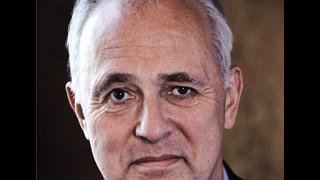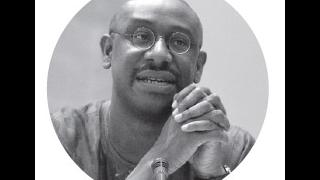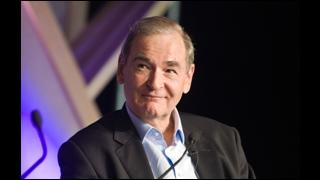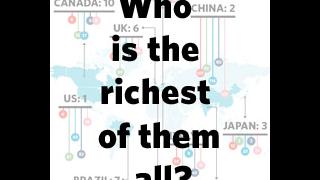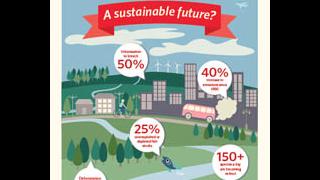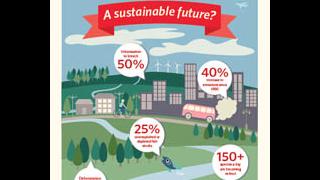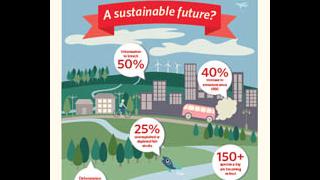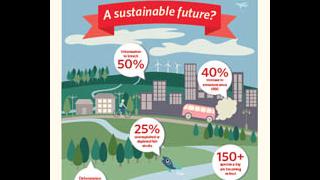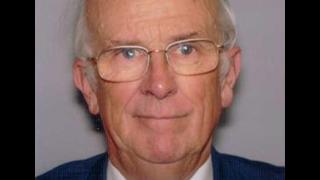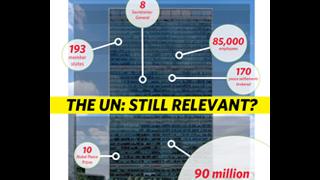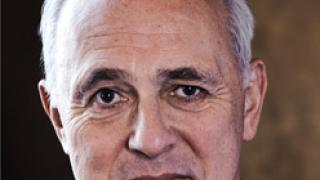
Lord Malloch-Brown suggests that the crisis facing the EU highlights the need for more inclusive global economic governance that can catalyse a renewed commitment to the UN
In a year that witnessed the dramatic events of the Arab Spring, protests on Wall Street and the death of Osama bin Laden, the political limelight hovered conspicuously over the European continent, where leaders battled to save the euro – the one-time dream of many a politician following the Second World War.
The evolving eurozone crisis continues to challenge the imagination of European leaders to manage interconnected events that have global economic and political ramifications. "Governance as usual" is struggling against difficult odds to meet this new kind of globalised challenge. An understanding of the true nature of the crisis in Europe highlights the need for a legitimate and inclusive model of international co-operation, which is the United Nations at its best.
The ailing peripheral states of Europe, with Greece the worst affected, have dominated the concerns of investors, as their economies lurched into an escalating sovereign debt crisis and half-baked bailouts failed to stem the collapse. Yet, while the crisis has been fanned by weak European political leadership, its root is a structural global economic dislocation stemming from the build-up in the Western world of unsustainable sovereign and household debt over decades, to enormous proportions. This build-up occurred because politicians and consumers alike failed to confront their relative loss of wealth in the world. Borrowing filled the hole and enabled Europe to live beyond its means, buying more than it could afford from China and elsewhere. Of course, faltering economic growth – the very cause of increased borrowing – has made the bill for servicing this massive debt unaffordable for householders and, in the case of Greece, entire countries. And as the European economy is intrinsically interlinked, a debt problem for Greece is a problem for all of us.
The push towards austerity, coupled with the serial political incompetence of European leaders in addressing the crisis, has led to public protests in several countries and smouldering tensions between EU member states that threaten not only the survival of the euro, but also the entire institutional architecture of the European project, not to mention the wider model of liberal European social democracy that, along with the UN, has been part of the post-1945 international order.
The prognosis is bleak. The old economic system is under strain. Trust in politicians and institutions is declining, and a revival of nationalist and populist sentiment is threatening Europe's values. In short, the eurozone crisis reflects massive shifts in relative wealth between nations and within nations that are shaking national governments and European institutions to their core.
The EU belongs to a younger and, on the face of it at least, more vigorous generation of global institutions than the UN. Formed for the most part some five decades after the UN, by a group of countries with a shared history and values, it represents a much more ambitious design. It does not merely have a 'general assembly' comprising its nation state members, but rather a council of ministers and directly elected parliament, a significantly larger budget (more than 50 times the value of the UN's core funds) and greater ambitions for supranationalism (what is the UN Charter if not a guarantor of national sovereignty?). So if the EU risks being mortally damaged by the crisis, what chance does the weaker, looser and more modest UN have of staying afloat?
Oddly, the latter's chances are much better. This is, in part, for a negative reason: namely, the peripheral role the organisation has played during this economic crisis. In 2008, the G20, the world's major economies, turned to the UN's cousins, the International Monetary Fund and the World Bank, to help stave off a global recession.
While the UN has had to cope with the fall-out – since 2008, the UN Development Programme has consistently reported on the negative impact of the global downturn on aid and on initiatives such as the Millennium Development Goals – it has, in many ways, remained a bystander where efforts to solve the crisis are concerned. Smaller nations have chosen to use it as a venue to complain about their marginalisation and exclusion from G20 decision-making, but the UN has not served as a platform or focal point for economic summits or discussions.
More positively though, while the EU appears now to represent the losers in the extraordinary global economic realignment that is under way, the UN, because of its universal character, encompasses the winners as well. It is for this reason that the organisation is likely to survive and, given the right ingredients, even thrive.
The UN offers what the G20 and Bretton Woods institutions cannot provide: a legitimate and inclusive platform for writing the new rules of a changing global economy. The leadership may come from the G20 or the Organisation for Economic Co-operation and Development, and the ideas from a Beijing or Washington think tank, but the codification, legitimacy and universal buy-in can only come from the UN.
This is why we may yet see a period of renewal at the UN, even as the dark clouds continue to gather over Europe and the global economy. Emerging powers and small countries alike need a rules-based world of orderly markets and trade because they tend, in many cases, to depend on international trade for their prosperity. They need the global system to work in ways that mattered less when their economies were closed and Europe stood astride the international trade. And for globalisation itself to enjoy sustained political support, we need UN institutions that are capable of leading the charge against poverty and towards basic education and health for all.
These are indispensable components of the kind of social contract that is needed to underpin a more collaborative system of global governance. The UN was brought into existence by a world war that began in Europe. Now, a much lesser but nevertheless tragic European crisis may perversely contribute to a renewed commitment to the UN.
Lord Malloch-Brown is Chairman of Europe, Middle East and Africa at FTI Consulting. He was a Minister of State in the UK Foreign and Commonwealth Office with responsibility for Africa, Asia and the UN from 2007 to 2009. He previously served as UN Deputy Secretary-General, head of the UN Development Programme and Vice President of External Affairs at the World Bank

